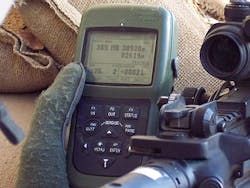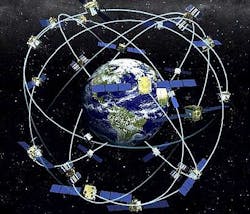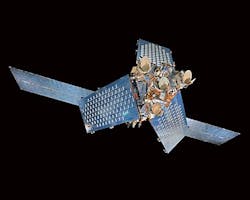Boeing to enhance navigation technology to keep GPS receivers working amid jamming, RF noise, and interference
WASHINGTON, 4 Oct. 2012. Satellite navigation experts at the Boeing Co. Defense, Space & Security segment in Huntington Beach, Calif., are moving forward with a U.S. Navy research program to keep GPS receivers working amid electronic jamming and interference by augmenting Global Positioning System (GPS) satellite with the Iridium commercial satellite communications system.
Officials of the Naval Research Laboratory (NRL) in Washington awarded a $40 million sole-source contract to Boeing Tuesday to optimize technology for the Navy High Integrity GPS (HIGPS) program for use in an operational environment.
The HIGPS is a local GPS enhancement that capitalizes on the Iridium low Earth orbit constellation of 66 orbiting satellites to improve satellite navigation performance over stand-alone GPS navigation and guidance -- especially when the GPS satellite constellation is unavailable due to electronic jamming.
Boeing won a $153.5 million contract four years ago for the initial phase of the HIGPS program to investigate enhanced satellite navigation and timing technologies. Boeing finished with the program's first phase last year.
In 2009 Boeing announced its engineers had completed the Enhanced Narrowband software modification to computers on Iridium satellites to enable Iridium spacecraft to broadcast second-generation GPS-aiding signals to enable rapid, more accurate GPS position fixes anywhere in the world.
The GPS-aiding signals are designed to enable appropriately equipped warfighters to lock on and maintain a GPS signal quickly, even while operating in RF signal-restrictive areas like cities, forests, mountains, and canyons, as well as under enemy jamming attempts or amid battlefield RF noise, Boeing officials say. In the program's first phase, Boeing also demonstrated the acquisition of a GPS signal under substantial jamming while moving.
The principle behind HIGPS capability involves satellite signals from Iridium satellites and the U.S. Air Force-operated GPS mid-Earth-orbit navigational satellites. Iridium provides a powerful signal and rapidly changes ground track to accelerate an initial position fix. The GPS system, meanwhile, provides navigational data in time, location, and velocity.
The result is an augmentation to GPS that provides HIGPS receivers with improved navigation, high signal integrity, precision accuracy, and more jam-resistant capabilities. HIGPS also has the potential to provide geographic positioning data to within centimeters -- a vast improvement over current stand-alone GPS that provides data within meters -- Boeing officials say.
Boeing engineers in the initial phase of the HIGPS program developed a concept of providing GPS augmentation data and signal acquisition in a GPS-jammed environment using Iridium -- a mobile satellite service communications system with global coverage.
The Iridium satellites and ground command-and-control infrastructure enabled Boeing to develop the augmentation infrastructure necessary to deliver HIGPS satellite navigation and guidance capability to end users.
Working on the first phase of the HIGPS program with Boeing's engineers in Huntington Beach, Calif., were experts at the Boeing Phantom Works Advanced Network and Space Systems segment in St. Louis; Iridium Communications Inc. in McLean, Va.; Rockwell Collins in Cedar Rapids, Iowa; Coherent Navigation in San Mateo, Calif.
The contract announced this week is for a two-year program for Boeing experts to optimize the HIGPS technology they developed previously in an operational-like environment, and make it suitable for a fully operational capability, Navy researchers say.
Boeing engineers will optimize HIGPS user equipment, reference stations, and the NRL HIGPS operations center to create a mission-ready system to support operational test and evaluation.
For more information contact Boeing Defense, Space & Security online at www.boeing.com/bds, or the Naval Research Laboratory at www.nrl.navy.mil.
Also contact Boeing Phantom Works at www.boeing.com/bds/phantom_works, Iridium at www.iridium.com, Rockwell Collins at www.rockwellcollins.com, and Coherent Navigation at http://coherentnavigation.com.
Follow Military & Aerospace Electronics and Avionics Intelligence news updates on Twitter


